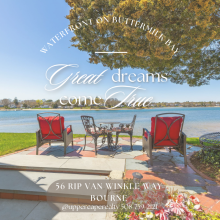Marion Planning Board denies solar project permit
MARION — Planning Board members voted Monday to deny a special permit to build a solar array at 78 Wareham Street following a debate with the company that requested the permit, ZPT Energy Solutions.
At the previous meeting, board members and ZPT reached an impasse over the definition of “large-scale” tree clearing, an act prohibited by a town bylaw.
The solar company brought in attorney George Clancy to make a case for the project. Clancy argued that Massachusetts recognizes solar energy as a priority, meaning that a town hoping to ban a solar project must prove it harms the health, safety or welfare of the community.
Clancy stated that since the proposed project has state support, meets all regulations and does not pose a danger to inhabitants, it should be approved.
Though the proposed solar array meets regulations, Vice Chair Stephen Kokkins express concern that with the project would negatively impact Marion.
“The character and the nature of the village and the town of Marion would be significantly altered by such a monolithic utility, even though it is permitted.”
Board member Norm Hills was also quick to point out that although the state supports solar projects, the Attorney General also approved the more restrictive bylaw.
This argument did not seem sound to Clancy, who asserted that, “You don’t have to look far to find bylaws that have been approved by the attorney general and later overturned.”
Clancy pressed the board, asking for a determination on what large scale clearing entails.
Some board members understood the importance of the request.
“I understand the nature of the objection,” Kokkins said, “Because an important parameter of the bylaw is not defined.”
However, Chair Will Saltonstall disagreed. He stated that in reviewing the permit with the town counsel, he was told that “it’s not in our job to define what ‘large-scale’ is.”
In response, Clancy suggested that if the Planning Board didn’t set a number for large-scale clearing, a court would.
Some board members did come to the meeting with concrete numbers. Andrew Daniel said after consulting with other towns, the definition of “large-scale” clearing varied, but universally 20 acres was considered large. ZPT’s project requests to clear cut 18 acres.
Other board members took a different approach to defining “large-scale.” Norm Hills suggested that the cleared area shouldn’t be larger than half of the total property.
Though the board was mostly in agreement that the bylaw prohibited the proposed project, Eileen Marum argued that the state law trumps the town bylaw.
“It says ‘no zoning ordinance or bylaw shall prohibit or unreasonably regulate the installation of solar energy systems… except when necessary to protect the public health, safety or welfare.’ This is state law,” Marum said firmly. “State law supersedes local bylaw. So I don’t see how we could possibly stop this solar farm from coming in.”
Chris Harris, whose property is closest to the proposed site, expressed his about the noise from the solar array batteries, which can reportedly reach 85 decibels. Harris cited the “health and welfare” clause of the state law to argue against the project, stating that the noise would impact his welfare.
Four planning board members voted to deny the special permit, with Marum voting to allow it because of the “large-scale” confusion and she believes state laws supersede local bylaws.
The board also voted to deny a site review on the grounds that they had rejected the permit.
Additionally, the board discussed making a future amendment to the solar bylaw to avoid any confusion.
Clancy suggested that the permit denial may not be the end of the project for ZPT.
“You can decide ‘no,’ absolutely,” said Clancy, “And then my client will decide whether or not they are going to appeal that decision,”













